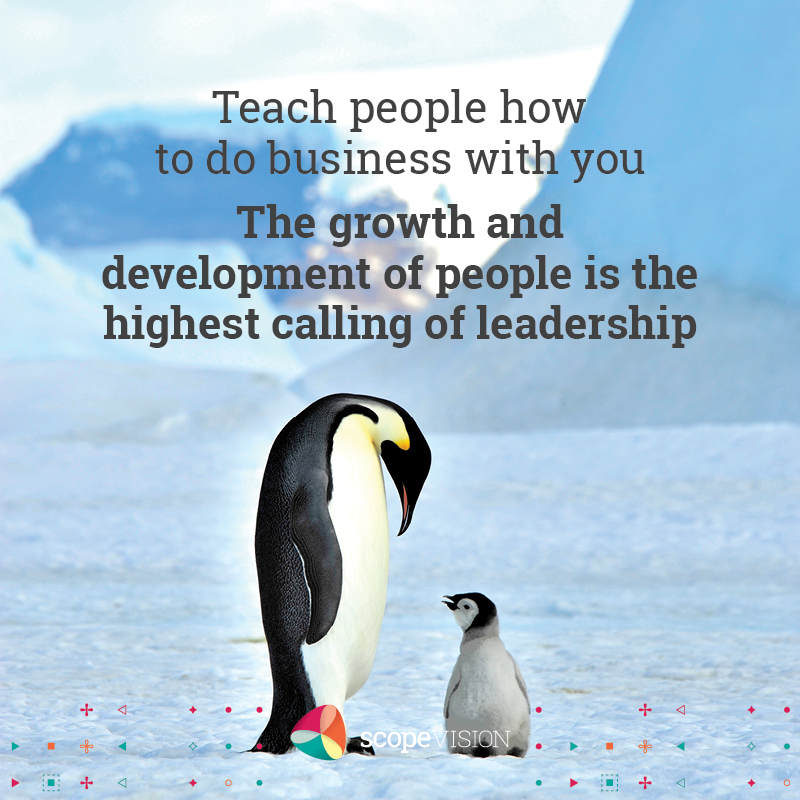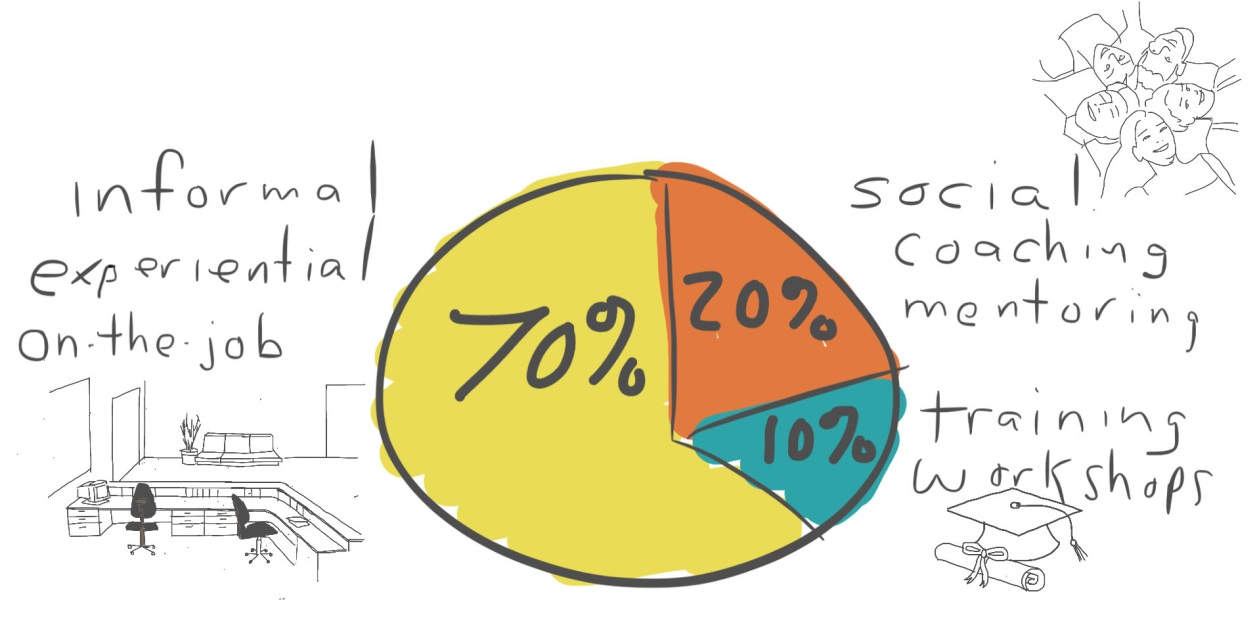The growth and development of people is the highest calling of leadership; Helping others grow should be your journey!
One of the most powerful motivators at work is to feel that you are progressing and contributing to meaningful work. What separates highly effective leaders from average ones is their recognition of the power of coaching.
The 70:20:10 principle: Making the most of everyday opportunities
The 70:20:10 principle surmises that 70% of an employee’s learning and development happens informally when they are on the job, 20% is attributed to social coaching and mentoring, with the final 10% credited to structured learning programs. What this means for those of us in management is that our weeks are filled with infinite opportunities to encourage and evoke transformation in our teams. We need to invest time in understanding what drives each of our team members and help them build connections between their meaningful work and the company’s objectives.
One way we can do this is to commit to always speaking the truth. Providing timely feedback with the desire to see each of our team members reach their full potential will see people move forward in great strides. Competency skyrockets once a ‘ripple effect’ is enacted. Enabling people to learn and grow by holding them accountable results in change; allowing the ripple effect to take hold. The formula for the ripple effect is quite simple:
Action + Learning = Change
Coaching conversations once held, directly impact on performance outcomes and achievements. Growth and development achieved through a great learning strategy evokes change.
5 keys to holding great coaching conversations
Dance in the moment....Listen to conversations with people
Dance in the moment; the phrase says it all! Focus and concentrate on the next steps, listening only to the tone, mood and nuances of the person engaged in the conversation with you. Listen soulfully for meaning as they share with you their choices on how they would like to develop.
Harness the power of great questions
Great coaches ask great questions; they ask, they don’t tell! They see their purpose as the catalyst to increased self-awareness and consciousness in the people that they coach. When we demonstrate or train it is our time in the spotlight, when we adopt a coaching or mentoring approach, we need to bring great questions to the arena. For a person to change they must want to; they need to make the choice. Asking open, probing and reflective questions rather than telling them what they need to improve on is the game plan of a coach. Great questions ignite ownership as your coachee commits to and explores with you the actions they will take to enable their personal change journey..
Agree on and formalise a game plan together
Whilst your role as the coach is not to provide answers, it is definitely to assist the coachee to explore the options they can implement so that the change you both want will occur. Always use your knowledge to guide and shape them but remember that ownership and accountability of actions remains always with the coachee. A great coaching relationship evolves when you follow this rule. Once a plan is established it is critical that you provide your coachee with everything they need to enable the plan. Agree on how often you will touch base and ensure you have written your action plans with SMART goals [specific, measurable, achievable, relevant and timely]. Let them know you are on the sidelines cheering them on to succeed.
Be proactive and positive
As people grow it is often hard to see the ‘forest for the trees’. As the coaching journey unfolds, your role as coach changes. You now need to recognise, empathise and proactively problem solve, hurdles and challenges with the coachee as they encounter them. When learning something new there are always variables encountered that fall outside of the norm. It is in this instance that a coach steps back up to the plate, to question the circumstances that the coachee is experiencing. Acknowledging frustrations and focusing them on missing information diminishing angst, becomes the goal of the coach. Amending and updating your coaching strategies becomes the plan.
Build accountability
Accountability for all actions is paramount; both the coach and the coachee must deliver on all commitments made. Engaging in crucial conversations at the right time fosters and nurtures an environment of accountability and responsibility; building respect for all parties. Great coaches place accountability firmly at the corner stone of success.
Using the GROW model as the framework for structuring a coaching journey
The GROW model evolved in the 1980’s from contributions made to coaching theories by Sir John Whitmore, Graham Alexander and Alan Fine. Its focus is a four step framework used to guide and enable both coach and coachee throughout their journey. As each stage is explored, the journey comes one step closer to fruition.
So what does GROW stand for and how do you base great coaching conversations on GROW; let’s explore:
- Goal
- Current Reality
- Options [or Obstacles]
- Will [or Way Forward]
1. Establishing the Goal
The first place to start is to agree on your goals. As you establish them together,
be clear on the behaviour you want to change or improve. Then describe the new behaviour in a SMART-ly written objective [specific, measurable, achievable, relevant and timely]. To gain clarity on your goals, explore questions together along the lines of:
- What do you want to achieve?
- What will success look like?
- When do you want to achieve that by? Is that realistic?
- How will you know when you have achieved that goal? What will it look like? What report or measurement can help us in tracking your growth?
- How does this goal impact on your career and team objectives? Do we have both in alignment?
- What is the real value in this goal for you?
2. Examine the Current Reality
Next it’s time to explore the current reality of the person you are coaching. You can’t solve a problem you haven’t properly explored. Great questions to help you uncover the status quo at this stage are:
- What is happening now (what, where, who, when, and how often)? What is the effect or result of this?
- How do you know this is accurate? How have you verified that this is true?
- What other factors are relevant?
- Where are you now in relation to your goal? Have you already taken any steps towards achieving it?
- What skills/knowledge/attributes do you have?
- What is working well for you right now?
- What do you have that you are not using at the moment?
- What’s holding you back?
- Does achieving this goal conflict with any other goals or objectives?
- What is really going on (intuition)?
3. Explore the Options
Now it’s onto the positives! It’s time to determine what’s possible and explore all the options. Brainstorm as many options as conceivable; then help the coachee make the choice as to the one they want to commit to. Remember as coach your role is to guide and question, it’s important to ensure that the coachee does the talking. Questions you could focus on at this stage include:
- What are your options?
- What could you do to change the situation?
- How have you tackled this or a similar situation before?
- What could you do differently this time?
- Who do you know who has encountered a similar situation?
- Give me 5 options
- If anything was possible what would you do?
- Would you like a suggestion from me?
- Which options are of interest to you?
- Would you like to choose an option to act on?
4. Establish the Will
The goal is set, reality is explored, options have been considered, now it’s time to establish the will. How motivated and able is the coachee to stick to the game plan and achieve their goals? Great questions to ask now include:
- What option, or options did you choose?
- So, what will you do now, and by when? What else will you do?
- On a scale of 1-10 how committed / motivated are you to doing it? What prevents this from being a 10? What could you do to bring this closer to a 10?
- What could stop you moving forward? How will you overcome this?
- How can you keep yourself motivated?
- When do you need to review progress? Daily, weekly, monthly?
- What support do you need and from whom?
There you have it… the keys to great coaching! So get out there, start the journey… Lead well!
If you enjoyed this article hit the 💚 button below and share it with someone you know would find value in reading it.












